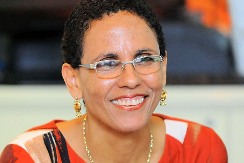Beijing+20: Solidarity for Gender Equality

Photo credit: UN Women/Pornvit Visitoran
The Fourth World Conference on Women in Beijing was a culmination of international normative agenda setting in which gender equality was acknowledged as central to global development and security.
Starting in 1992, the Rio Declaration on Environment and Development noted, though too briefly, that women’s full participation was essential to achieving sustainable development. In 1993, women’s rights advocates with thoughtful strategizing and positioning, ensured that the World Conference on Human Rights affirmed state accountability to respect, protect and fulfil women’s human rights. At the International Conference on Population and Development in 1994, historic agreement was reached on the non-negotiability of women’s access to sexual and reproductive health and reproductive rights.
With this foundation, at the Beijing conference, governments and women’s NGOs articulated that the transformations needed across the economic, social, cultural, political and environmental spheres required the thinking and actions of everyone. In essence, the Beijing Conference launched gender mainstreaming as both a strategy and a message. We are all obligated to end discrimination and to empower women.
The BPFA is far reaching in the analysis and prescriptions. It speaks to intersecting inequalities; to the redistributive role of the state; to the need to end impunity for violence against women; to women’s access to economic assets and opportunities; to actions to reduce militarization and to build a culture of peace. And all the way through, women’s agency as the precondition for this transformation is reiterated.
Using this document as the guide, since 1995, many member states have formulated national gender policies and sector plans. And in the process of this formulation, we have learnt some lessons. Where institutional mechanisms responsible for coordinating gender equality outcomes are under-resourced and without sufficient authority to compel the accountability of sector ministries, the gender policies remain mostly paper commitments.
We have learnt too that where women and the most marginalized amongst them secure the attention of the state, there is a higher likelihood of progress. So because women’s movements and service providers were so much ahead in activism on impunity for domestic violence, one of the significant achievements of the last nineteen years is the almost universal adoption of laws addressing domestic violence.
There have been other important achievements, including the adoption of Security Council Resolution 1325 and associated resolutions which seeks to secure women’s voice and influence in peace and security processes and which identifies gender-specific harms inflicted on women in conflict contexts.
We know that addressing intersecting inequalities is the best enabler of the empowerment of women; that universal and gender-responsive provision of education, health and social protection is key to redressing inequitable power relations between women and men.
But now, 19 years later, we have to ask of our institutions and ourselves, why is it that we still have so much left undone, unchanged. Why do so many women and girls have lives constrained by inequalities and oppressions that limit their voice, their choices and their safety?
It is for all of us to ask hard questions of ourselves and the institutions that we serve. How can we do better? How can we be better?
We are witnessing a growing solidarity for gender equality, including through contributions of men as advocates. Let us use our collective energies to reach the most marginalized women and girls by tackling stark and rising inequalities and multiple forms of discrimination. Let us increase investments in gender equality and women’s rights. Let us support feminist and women’s movements to exert greater influence in policy decisions.
We must seize all opportunities at national, regional and global levels and give new impetus to the achievement of gender equality and women’s and girls’ enjoyment of their human rights.
Roberta Clarke
Regional Director
UN women Regional Office for Asia and the Pacific